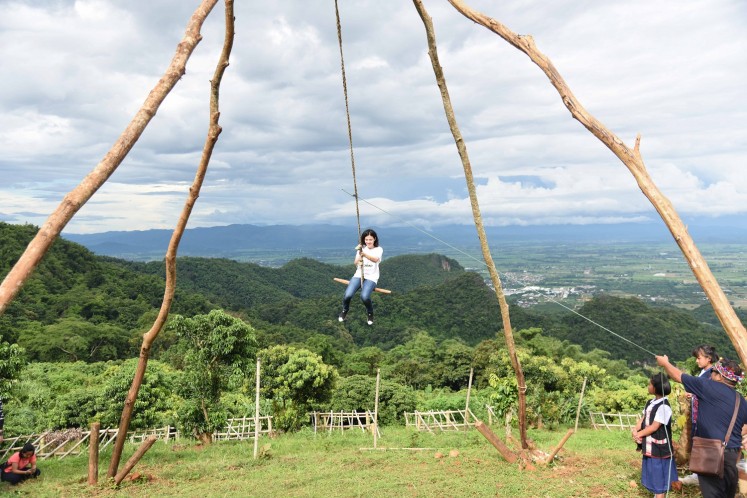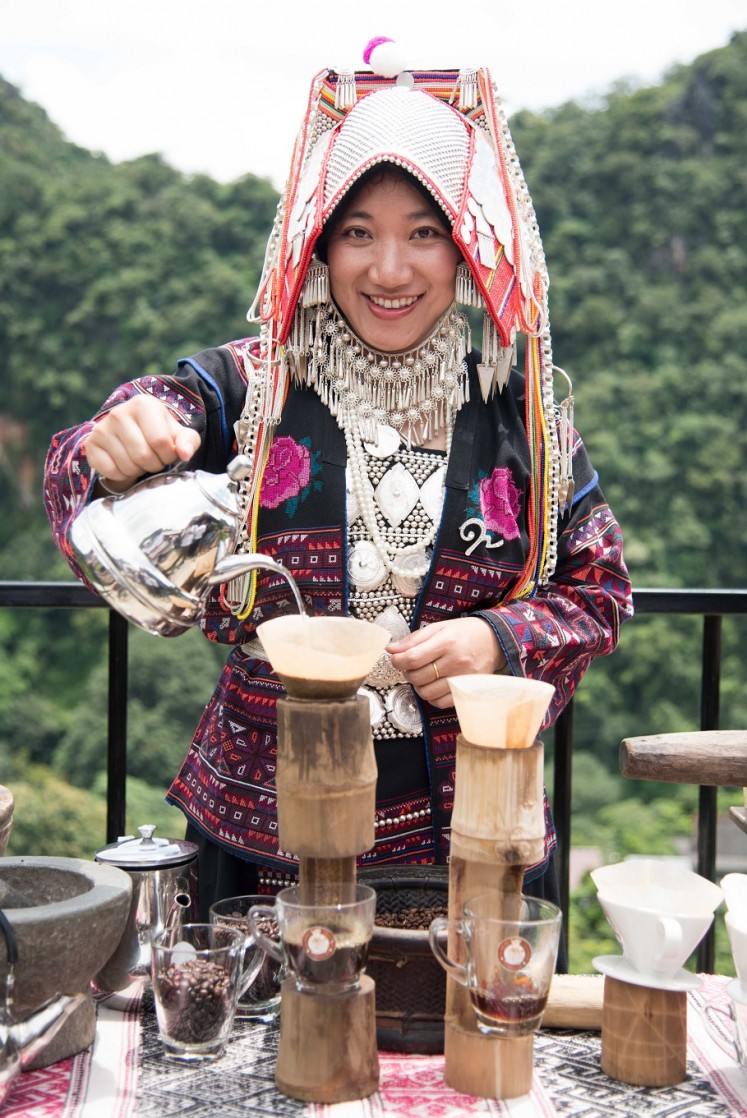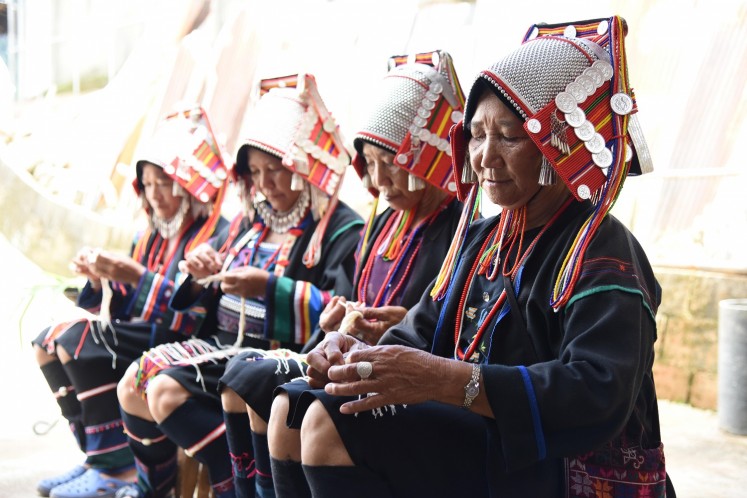Popular Reads
Top Results
Can't find what you're looking for?
View all search resultsPopular Reads
Top Results
Can't find what you're looking for?
View all search resultsLearning Akha hill tribe’s way of living in Pha Mee village
Nowadays, Akha tribe grows coffee for a living. However, it was not always the case. Back in the early 1970s, the villagers produced opium to make ends meet.
Change text size
Gift Premium Articles
to Anyone
T
he Akha’s giant swing, located on the hill of Pha Mee village in Mae Sai district, Chiang Rai, Thailand, was made of woods, ropes and tire. No safety equipment was seen around the swing, only a villager controlling one rope on the side.
Our guide, who is also Local Alike sustainable tourism initiator, Bow Pongnin, ensured us the swing is safe, explaining that it has been a tradition in the village for men to remove the wooden seat and swing as high as they could to prove their manhood.
I felt excited when seeing Pongnin and two Akha natives hopped on the swing. After they were done, I raised my hand, wanting to try it too, of course with a seat on.
As I walked towards the giant swing, I could see the bear-shaped mountains, reminding me of Akha tribe community leader Pho Luang’s story that Pha Mee village’s name was derived from the shape.
I climbed the seat and hold on the rope tightly. Two villagers pulled my seat and I screamed at the top of my lungs as the cool breeze hits my cheeks. I tried to keep my eyes open to make sure I would not fall down the hill as well as to record the breathtaking views on my mind.
After a while, I asked the villager to stop the swing. I felt fortunate as I landed on the ground, fully intact.
Read also: Three must-visit places in Chiang Rai
The giant swing is a central spot during Akha's New Year. (Thai AirAsia/Supawas Inthip (Ohm))The giant swing is not merely for entertainment, but a part of Akha tribe traditions I learned during Asean Travel Journo Camp, an event initiated by Thai Journalists Association and Thai AirAsia.
Though the appearance looked decent, the giant swing plays a crucial role in the life of Akha people, indigenous tribe living in the northern part of Thailand.
In addition to a place for the men to show their manhood, the giant swing’s area is a central spot during Akha's New Year. In fact, it is considered sacred as visitors are not allowed to look back while entering the gate. “They believe it is going to give bad luck,” said Pongnin.
After trying the giant swing, Pongnin and Pha Mee Community Tourism Enterprise vice president Phakakarn Rongpracharat brought us to a wooden lodge, explaining the community relationship with Thailand former King Rama IX.
Coffee brewing is a part of the tourist activities on offer in Pha Mee village. (Thai AirAsia/Supawas Inthip (Ohm))Nowadays, Akha tribe grows coffee for a living. However, it was not always the case. Back in the early 1970s, the villagers produced opium to make ends meet.
Opium production was not the only issue. Pha Mee village is located a stone’s throw away from Myanmar border and conflicts happened frequently, making some of the villagers wanted to move from the area.
Fortunately, with the help of King Rama IX, Pha Mee has become a livable peaceful village. The King was said to study the area and suggest them to grow coffee, a tradition they still keep up to this day.
Though peace has come to the village, some people still associated Pha Mee with drugs.
Read also: Workshop aimed at luring tourists to remote Papuan islands
To change the negative image and promote the village, 30 members of the community worked hand-in-hand to develop community-based tourism program, starting from October last year.
Before landing on the giant swing, this tourism community brought us to catch a glimpse of their daily lives through several activities, such as weaving, making local snack, homecoming tradition and trying Akha traditional clothing that includes a five-kilogram silver headpiece. These activities were designed for tourists to learn more about their culture.
The village elders prepare a homecoming ritual for visitors. (Thai AirAsia/Supawas Inthip (Ohm))Rongpracharat told The Jakarta Post that they enjoy hosting people. “At first we did not have any idea how to start [the community-based tourism], but with the help from several organizations, such as AirAsia and Local Alike, they started to understand it,” she said.
She added that tourism activity had become one of the ways to preserve the tradition.
“Time has changed. Sometime, the children feel shy to wear their traditional Akha clothing. [Since we started the tourism program] the children began to feel proud [to wear the traditional clothing],” she explained.
After the entire activities were done, the community sent us back to our vans. We bid goodbye and, surprisingly, I felt a bit melancholy. In less than 12 hours, this community not only made me understand their traditions, but their hospitality made me, temporarily at least, feel as a part of them. (kes)










